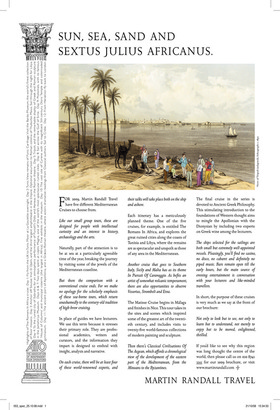SUN, SEA, SAND AND SEXTUS JULIUS AFRICANUS.
F OR 2009, Martin Randall Travel have five different Mediterranean Cruises to choose from.
Like our small group tours, these are designed for people with intellectual curiosity and an interest in history, archaeology and the arts.
Naturally, part of the attraction is to be at sea at a particularly agreeable time of the year, breaking the journey by visiting some of the jewels of the Mediterranean coastline.
But there the comparison with a conventional cruise ends. For we make no apology for the scholarly emphasis of these sea-borne tours, which return unashamedly to the century-old tradition of high-brow cruising.
In place of guides we have lecturers. We use this term because it stresses their primary role. They are professional academics, writers and curators, and the information they impart is designed to enthral with insight, analysis and narrative.
On each cruise, there will be at least four of these world-renowned experts, and their talks will take place both on the ship and ashore.
Each itinerary has a meticulously planned theme. One of the five cruises, for example, is entitled The Romans In Africa, and explores the great ruined cities along the coasts of Tunisia and Libya, where the remains are as spectacular and unspoilt as those of any area in the Mediterranean.
Another cruise that goes to Southern Italy, Sicily and Malta has as its theme In Pursuit Of Caravaggio. As befits an artist of somewhat volcanic temperament, there are also opportunities to observe Vesuvius, Stromboli and Etna.
The Matisse Cruise begins in Málaga and finishes in Nice. This tour takes in the sites and scenes which inspired some of the greatest art of the twentieth century, and includes visits to twenty-five world-famous collections of modern painting and sculpture.
Then there’s Classical Civilisations Of The Aegean, which affords a chronological view of the development of the eastern part of the Mediterranean, from the Minoans to the Byzantines. The final cruise in the series is devoted to Ancient Greek Philosophy. This stimulating introduction to the foundations of Western thought aims to mingle the Apollonian with the Dionysian by including two experts on Greek wine among the lecturers.
The ships selected for the sailings are both small but extremely well-appointed vessels. Pleasingly, you’ll find no casino, no disco, no cabaret and definitely no piped music. Bars remain open till the early hours, but the main source of evening entertainment is conversation with your lecturers and like-minded travellers.
In short, the purpose of these cruises is very much as we say at the front of our brochure: Not only to look but to see, not only to learn but to understand, not merely to enjoy but to be moved, enlightened, thrilled.
If you’d like to see why this region was long thought the centre of the world, then please call us on 020 8742 3355 for our 2009 brochure, or visit www.martinrandall.com


















































































 Previous page
Previous page